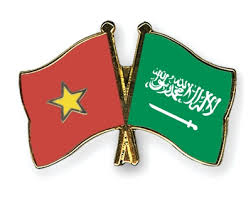Vietnam – Saudi Arabia to negotiate visa exemption agreement
 Vietnam-Saudi Arabia cooperative relationship has been promoted but it is not on par with each country’s potential. Therefore, both countries need to make greater efforts to realize their opportunities for cooperation.
Vietnam-Saudi Arabia cooperative relationship has been promoted but it is not on par with each country’s potential. Therefore, both countries need to make greater efforts to realize their opportunities for cooperation.
This was stated at the first session of the Vietnam – Saudi Arabia joint committee on economic, scientific and technological cooperation, co-chaired by Vietnamese Deputy Minister of Industry and Trade Le Duong Quang and Saudi Arabian Deputy Minister of Economics and Planning Ahmed Bin Ibrahim Al Hakami.
During the meeting, the two sides reviewed their relationship and proposed solutions to strengthen cooperation in trade, oil and gas, industrial and agricultural production, finance, banking, transportation, investment, construction and labour.
They emphasised the need to establish a mechanism to ensure food and energy security, with a focus on Saudi Arabia investing in Vietnamese agriculture to supply rice for the west Asian countries and supplying crude oil to Vietnam.
Deputy Minister Quang asked Saudi Arabia to recognise Vietnam’s market economy; implement the protocol on oil, gas and mineral cooperation, which was signed in April 2010; and help Vietnam build oil refineries and power plants. He also recommended promoting trade exchange between the two countries.
Deputy Minister Ahmed Bin Ibrahim Al Hakami asked both sides to take initiatives to help the business communities in both countries to expand cooperation for mutual benefit.
Specific plans for the cooperation should be carried out effectively, he said.
The two countries are negotiating agreements on visa exemption for diplomatic and official passport holders, protecting and encouraging investment, air transportation, an agreement between the two foreign ministries and another between the two central banks.
Saudi Arabia is now Vietnam’s biggest West Asian trade partner with trade turnover reaching US$284 million in 2010. Vietnam’s main exports to Saudi Arabia are seafood, tea, coffee, pepper, cashew nuts, rice, textiles, garments, and wood products while it imports plastic materials, liquefied gas, chemicals and related products, fertilizers, and animal feeds.
Source: VOV
